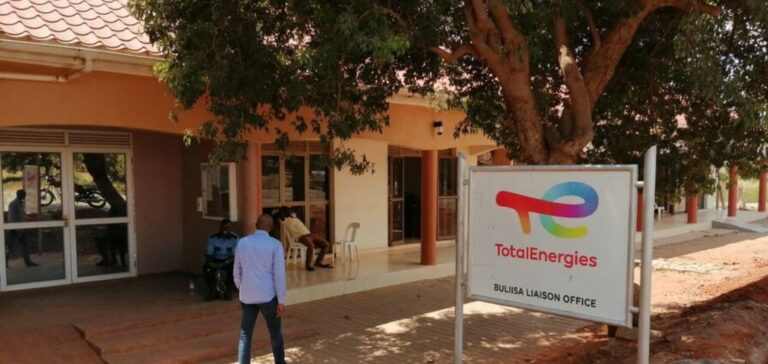TotalEnergies’ oil megaproject in Uganda is a “disaster” for the population, “has devastated the livelihoods of thousands of people” and “will contribute to the global climate crisis”, Human Rights Watch (HRW) deplored on Monday, calling for it to be halted.
Environmental and social controversies surrounding the EACOP oil project
Last year, TotalEnergies announced a $10 billion investment agreement with Uganda, Tanzania and China’s CNOOC, including the construction of a 1,443-kilometer pipeline (EACOP) linking the Lake Albert oilfields in western Uganda to the Tanzanian coast on the Indian Ocean.
However, the project has met with opposition from activists and environmental groups who believe it threatens the region’s fragile ecosystem and the people who live there. For the human rights NGO HRW, the project “impoverishes thousands of people” and will displace over 100,000. EACOP “has led to food insecurity and household indebtedness, contributed to children dropping out of school, and is likely to have devastating effects on the environment”, continues the NGO in a report based on over 90 interviews, including 75 displaced families in five districts of the East African country.
The oil project is “a disaster for the tens of thousands of people who have lost land that provided food for their families and income to send their children to school, and who have received inadequate compensation from TotalEnergies”, says Felix Horne, environmental researcher at HRW, in the report, before continuing: “EACOP is also a disaster for the planet, and the project should not go ahead”.
Several farmers interviewed by HRW said they had had to wait years for compensation, and had gone into debt. Some villagers said they were made to sign compensation agreements in English, a language they couldn’t read, while others also told researchers that “the presence of government and security officials at public meetings helped create an aura of intimidation”, HRW points out.
“They come here promising us everything,” one resident told HRW. “We believed them. Now we are landless, the compensation money is gone, the fields we have left are flooded and dust fills the air.”
TotalEnergies Responds to EACOP Oil Project Controversies
In a response sent to HRW in June, TotalEnergies stated that it had offered fair compensation to the farmers and that it would “continue to pay particular attention to respecting the rights of the communities concerned”. Ugandan President Yoweri Museveni, who has ruled the country with an iron fist since 1986, has repeatedly described the project as a major economic source for the landlocked country, despite a non-binding European Parliament resolution last year citing human rights “violations” against opponents.
At the end of June, twenty-six Ugandans and five French and Ugandan associations launched a new legal action in France to seek “reparation” from the giant TotalEnergies for the “damage” they claim to have caused by its controversial oil megaproject. In February, the Paris court ruled against opponents of the oil megaproject in Uganda and Tanzania, criticizing the NGOs for not having sufficiently explored the possibility of dialogue with the oil giant before taking legal action.






















